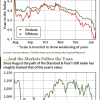Sorry, no content matched your criteria.
Featured Story
How the China Yuan Devaluation Is Dragging Down the Markets

Countless factors influence the global financial markets, but right now the biggest one is China's yuan devaluation.
Ever since August, when the Chinese central bank shocked the markets with a steep yuan devaluation, the Chinese currency has exerted a powerful - and mostly downward - pull on stocks.
Here's why the yuan carries so much weight - and what will happen next...
Countless factors influence the global financial markets, but right now the biggest one is China's yuan devaluation.
Ever since August, when the Chinese central bank shocked the markets with a steep yuan devaluation, the Chinese currency has exerted a powerful - and mostly downward - pull on stocks.
Here's why the yuan carries so much weight - and what will happen next...
